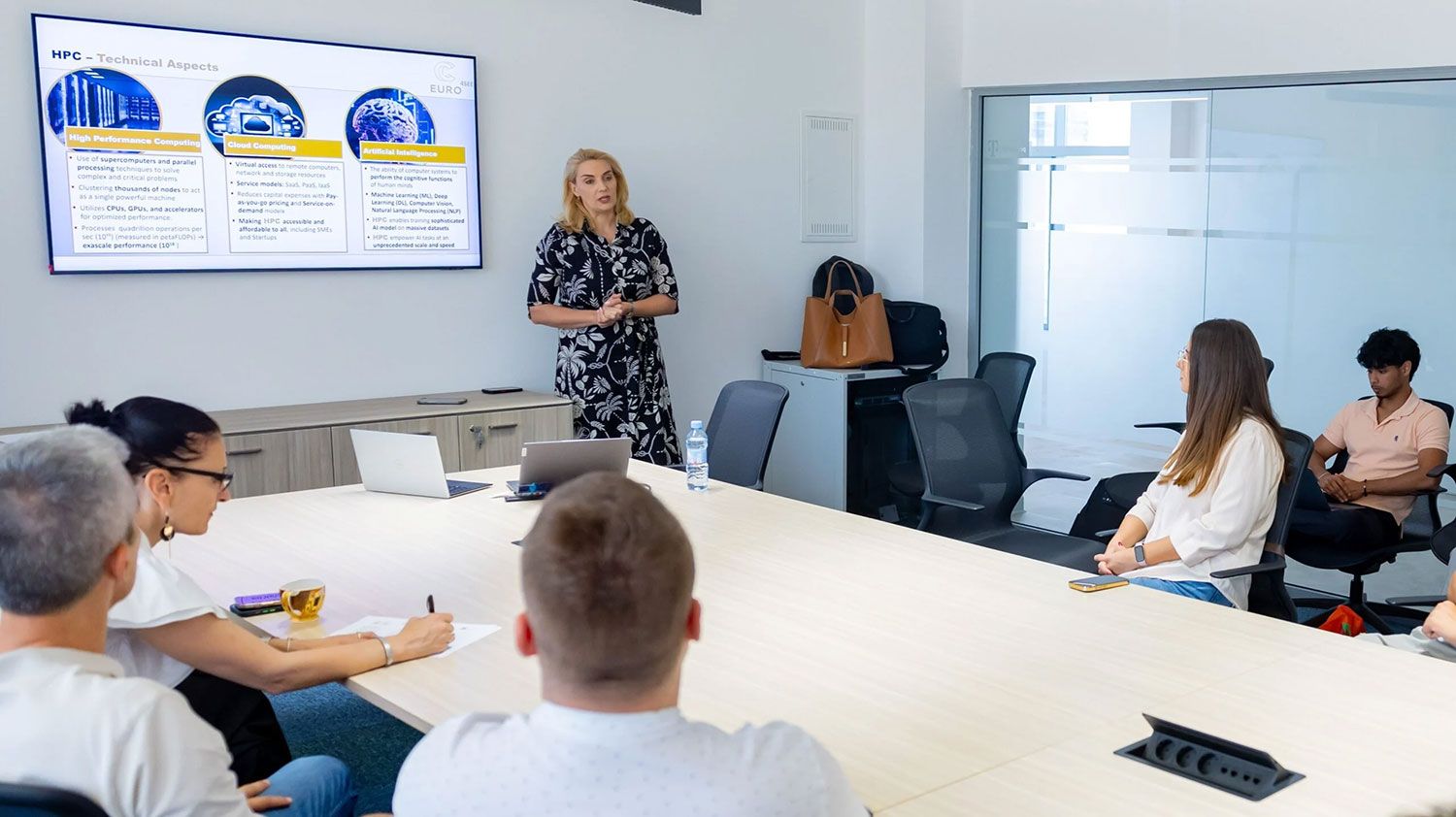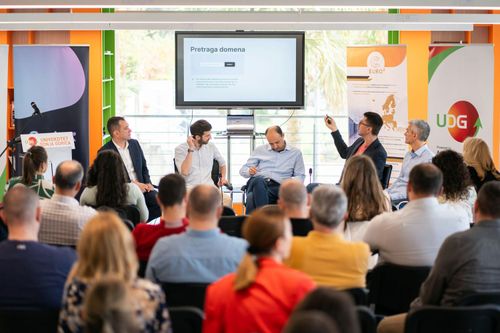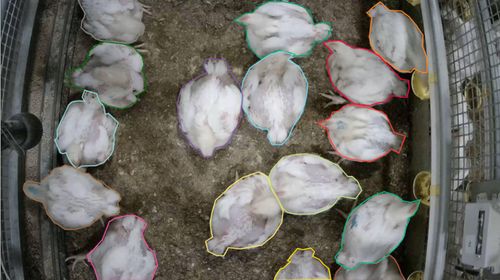NCC Montenegro: Transforming Ideas into Industrial Impact

About the University of Donja Gorica and NCC Montenegro
The University of Donja Gorica (UDG) is a private university established in 2007 in Podgorica, Montenegro. It is known for its modern approach to education, interdisciplinary studies, and strong connections with industry and international institutions. UDG offers undergraduate, master’s, and doctoral programs through several faculties, with a particular focus on innovation, entrepreneurship, research, and the practical application of knowledge.
The National Competence Centre for High-Performance Computing (NCC Montenegro) was established at the University of Donja Gorica (UDG) as part of the EuroCC project under Horizon 2020. It has since expanded through EuroCC2 and EuroCC4SEE (Digital Europe Programme), with the University of Montenegro (UoM) joining as an affiliated partner. NCC Montenegro is the country’s focal point for High-Performance Computing (HPC), High-Performance Data Analytics (HPDA), and Artificial Intelligence (AI). Our mission is to bridge the HPC skills gap, foster innovation, and accelerate digital transformation in academia, industry, and the public sector.

Image 1: NCC Montenegro and ICT Cortex hosted Supercomputing Opportunities for Industry Leaders.
Copyrights: NCC Montenegro
Supporting Montenegrin SMEs
NCC Montenegro employs a strategic funnel approach to SME engagement, beginning with broad industry outreach and mass communication about HPC benefits, progressing through business community engagement, and culminating in targeted meetings with HPC-prospective companies showing HPC/HPDA/AI potential.
To bridge the gap between SME ideas and fundable experiments, NCC Montenegro provides comprehensive support through multiple instruments:
- Training organization in areas of artificial intelligence, machine and deep learning and parallel computing and their applications in various domains (smart farming, weather modelling, bioinformatics, e-commerce, fintech, digital healthcare, construction and engineering, creative industries etc.)
- Organizing technical sessions to help SMEs refine their concepts into viable HPC-ready projects
- Providing assistance in moving business ideas into competitive grant applications with proper technical specifications;
- Evaluating whether SME concepts can benefit from HPC resources and suggesting appropriate computational approaches;
- Guiding SMEs through EuroHPC JU application processes and helping them understand resource requirements
- Connecting SMEs with academic partners and larger companies to strengthen their applications.
The Biggest Challenges Currently Faced by Montenegrin SMEs
The primary challenges faced by Montenegrin SMEs in applying HPC, AI, and Generative AI stem from significant infrastructure limitations and resource constraints. Most projects focus on AI and generative AI applications, but Montenegro lacks adequate computational resources, particularly HPC clusters with substantial GPU capacity. This critical infrastructure deficit forces many companies to seek external solutions, with a growing number applying for EuroHPC resources through NCC Montenegro's assistance.
NCC Montenegro has overcoming this challenge by helping SME to access to European HPC systems, allowing companies to start complex AI or parallel computing projects that would be unfeasible using local or national resources.
We have achieved notable success stories through industry-academia-public sector collaborations, particularly in:
- Finance: AI-driven solutions for financial services and fintech applications
- Healthcare: Medical AI applications and digital health innovations
- Smart Agriculture: Precision farming and agricultural optimization systems
- Meteorology: Advanced weather forecasting and climate modeling
These collaborative projects demonstrate how partnerships and access to appropriate computational resources can overcome infrastructure limitations, positioning Montenegrin SMEs to compete with EU partners and in AI-intensive markets.
HPC4SME AAT: HPC Readiness Assessment for Industry
The HPC4SME tool has been used for dissemination and education, market research, industry steering, and competence mapping among Montenegrin organizations across the public, academic, and business sectors. It represents a valuable first step in engaging industry, helping interested or targeted companies explore if—and how—they can benefit from HPC resources and NCC support.
Based on the completed questionnaire, the tool provides an assessment of organizational agility, cloud potential, and HPC needs, along with a customized report that includes a graphical representation and expert recommendations on the company’s level of HPC readiness.
By using the HPC4SME tool, we can identify actual and potential HPC users, companies with the capacity and competencies for innovative projects and business experiments, as well as actual market needs for education, training, and consultancy services provided by NCC.
Overall, the tool allows us to assess digital maturity, innovation needs, and readiness levels in relation to HPC performance and AI-driven solutions. It also enables us to support HPC-ready companies with technical expertise and subsidized access to Europe’s leading supercomputers, including funding opportunities for their research and development projects.
FIT4HPC?—Accelerating digital transformation by supercomputing opportunities
This paper presents the findings of a pilot study conducted within the framework of the EuroCC project, which explores the potential for HPC adoption among SMEs in Montenegro. The study, carried out between Q3 2021 and Q1 2022, aimed to assess HPC-related awareness, competencies and capacities in Montenegro based on an industry-diversified market sample. It employed both qualitative analyses and quantitative methods, alongside the HPC4SME automated assessment tool, to collect primary data and provide market-driven insights into the potential for HPC adoption in Montenegro.
Collaborations between NCC Montenegro and Industry
Through a strategic series of workshops and industry events, NCC Montenegro is equipping companies with the tools, resources and know-how to leverage HPC and AI for real-world innovation. Notable company developments supported by NCC Montenegro in the last 6 months which resulted by application for EuroHPC resources:
- FIVE G – successful application for Leonardo Booster for “Wasco AI” project - customized AI assistant designed for business applications, supporting multimodal interaction and adaptive support to various industries.
- PAID MNE- successfully applied for the LUMI supercomputer, providing substantial computational power for PAID –T simulations (advanced AI model for stock exchange trading).
- One AI - accessed the LUMI supercomputer to train AI models for a health-monitoring mobile app ("AI Heal") using global health data.
- FainTech – granted access to Leonardo Booster to train computer vision models for developing advanced models for defect detection on PCBs, under the ENFIELD project.
- Recrewty & DigitalSmart - secured access to the Leonardo Booster supercomputer for their GenAI-HPC4WB project, which focuses on enhancing HR recruitment processes (psychometric analysis, emotion recognition, and resume screening) using advanced models including LLaMA 3.x, Mistral, Wav2Vec 2.x, Whisper.
- COINIS - secured access to LUMI –G supercomputer to advance the development of their project AI Checker – an innovative platform for AI-text authenticity detection.
- The Faculty for Information Systems and Technologies (FIST) at the University of Donja Gorica (UDG), secured a access to the Leonardo Booster supercomputer at CINECA for conducting cross-lingual transfer learning research on large language models, evaluating how architecture and scale impact multilingual performance across LLM families ranging from 1B to 70B parameters.
- Center for Computer Science at the Faculty of Science and Mathematics secured benchmark access to Leonardo HPC supercomputer resources via a successful Benchmark call application to develop an AI-powered system for automatic segmentation of 3D mechanical assembly views in collaboration with French partners, with the goal of demonstrating efficient HPC usage.
NCC Montenegro: Supporting FF4EuroHPC Business Experiment
A consortium of five organisations participated in the FF4EuroHPC Business Experiment titled "AI/ML Enabled by HPC for Edge Camera Devices for Next-Generation Poultry Farms".
Companies DigitalSmart and DunavNET, as a technology partners, provided their expertise in AI/ML, IoT, and software development. UDG/NCC Montenegro contributed their domain knowledge and HPC expertise, enabling efficient model training on HPC infrastructure and model optimization. Mesopromet Franca and Radinović Company took part in the evaluation and piloting process, providing real-farm environments for testing and validating the developed solutions.
This collaboration created an innovative AI-powered poultry monitoring system that leverages computer vision and edge computing, while significantly accelerating model development and deployment through the use of HPC infrastructure.
Strengthening SMEs’ Competitiveness in the Smart Agriculture Sector
Monitoring chickens on large farms is highly labor-intensive and costly, and as representatives from the poultry industry have noticed, it may hinder the productivity of staff members for other tasks. Raising chickens to ensure animal well-being as well as humane food production requires close monitoring of environmental conditions: measuring air temperature, air humidity, CO₂, and ammonia levels are essential as a basis for successful production. Having insights into chicken body temperature, behavior, and growth provides the possibility of undertaking adequate measures on time.
The main challenge was efficiently monitoring chickens on large poultry farms, which traditionally requires significant manual labor and time. Main issue was to automate tasks such as counting chickens, detecting dead ones, estimating weight and size, and identifying early signs of disease using AI- and ML-powered prediction models. However, training and calibrating deep learning models on standard computing infrastructure was extremely slow and inefficient, making the process impractical. To overcome this, High-Performance Computing (HPC) was applied to accelerate the development of custom models, enabling reduction in training and calibration time.
With HPC, highly accurate models achieving over 90% precision in chicken detection and segmentation were developed and optimized for deployment on edge IoT devices equipped with cameras. These devices now perform real-time monitoring and integrate seamlessly into DunavNET’s PoultryNET platform. As a result, farms can detect diseases and abnormalities much faster — in minutes instead of hours or days — improving animal well-being, product quality, and sustainability by reducing greenhouse gas emissions. Moreover, the solution lowers manual labor costs and reduces chicken mortality rates by about 10%, saving farms hundreds of thousands of euros annually. Finally, HPC has strengthened SMEs’ competitiveness in the smart agriculture sector, enabling the commercialization of AI-powered monitoring solutions and opening opportunities for new revenue streams through third-party vendors.
Companies DigitalSmart and DunavNET explored how to utilize AI and ML to develop computer vision algorithms for sensors which monitor the aforementioned parameters. This was achieved with the help of cameras installed on poultry farms and edge AI devices with integrated ML prediction models. They contributed their expertise in AI/ML, IoT, and software development, while UDG/NCC Montenegro supported the project with domain knowledge and HPC capabilities. Mesopromet Franca and Radinović Company participated in the testing and evaluation phase, offering real-farm environments to test and validate the developed solutions.

Image 2: The solution lowers manual labor costs and reduces chicken mortality rates by about 10%, saving farms hundreds of thousands of euros annually.
Copyrights: FF4EuroHPC project
In general, HPC is enhancing competitiveness and innovation potential of SME in the commercial poultry sector. HPC provided the technology SMEs tools needed to develop smart agriculture solutions quickly and efficiently by using machine learning and computer vision for the needs of the poultry industry. The computer kit has become a part of the PoultryNET platform offering, and there is an opportunity to sell such components to third-party vendors active in the market of smart agriculture solutions.
HPC significantly accelerated the training and calibration of AI/ML models in AIMHIGH project, reducing the process from hours or days to just minutes. This allowed the development of highly accurate prediction models (>90%) for chicken monitoring and deploy them on edge IoT devices. As a result, the industrial partners improved real-time farm monitoring, reduced manual labor, lowered chicken mortality by around 10%, and saved substantial operational costs, enhancing their competitiveness and enabling new business opportunities in smart agriculture.
Overcoming Challenges
At the beginning of the project, the main challenges included handling and annotating the large volumes of image and video data required for training AI/ML models. Furthermore, optimizing and calibrating models to achieve high accuracy while making them suitable for deployment on edge IoT devices was technically demanding. Achieving efficient deep learning model training within reasonable timeframes using HPC presented a manageable challenge at the beginning of data processing.
Supporting SMEs for application to the FFplus Open Call
NCC Montenegro, in collaboration with the 29th IT Conference, successfully organized a dynamic two-day training event “HPC and Industrial Cooperation – Opportunities and Perspectives” on May 29th and 30th, 2025. During the event, NCC experts introduced the FFPlus open call to companies already engaged with NCC and explored potential collaborative opportunities to facilitate consortium development and reach prospective applicants.
As a result, six project applications were prepared for the FFPlus open call #2. NCC Montenegro team members helped the applicants in this process by providing technical guidance and support for proposal development.
Advice to SMEs that haven’t yet explored the use of HPC and AI in their business
SMEs shall not wait to explore HPC and AI, as these technologies are increasingly critical for staying competitive. Start small with specific business challenges that could benefit from faster computations, data analysis, or automation.
At NCC Montenegro, experts can support SMEs that have large amounts of data or simulations that take a long time to run. All interested SMEs can reach out to NCC Montenegro. SMEs can first test solutions on local resources, and then scale to available national HPC or EuroHPC infrastructure if needed.
Author: Luka Filipovic, PhD, Assistant Professor at UDG
